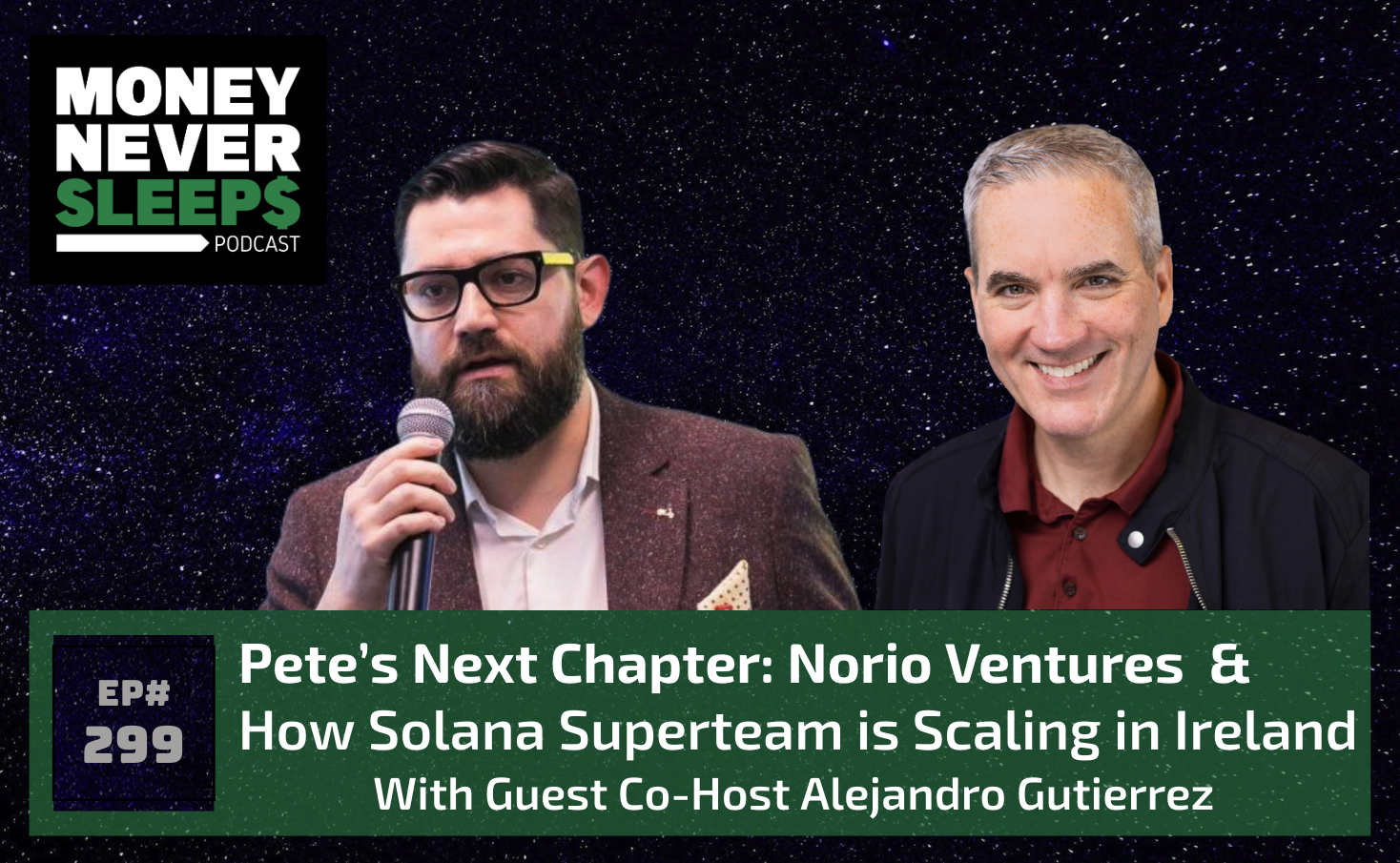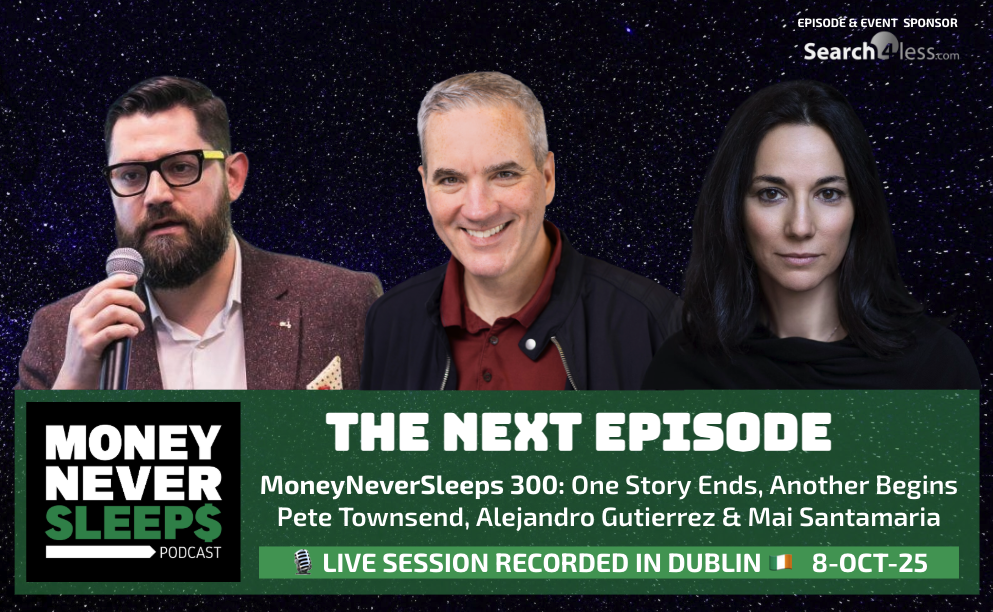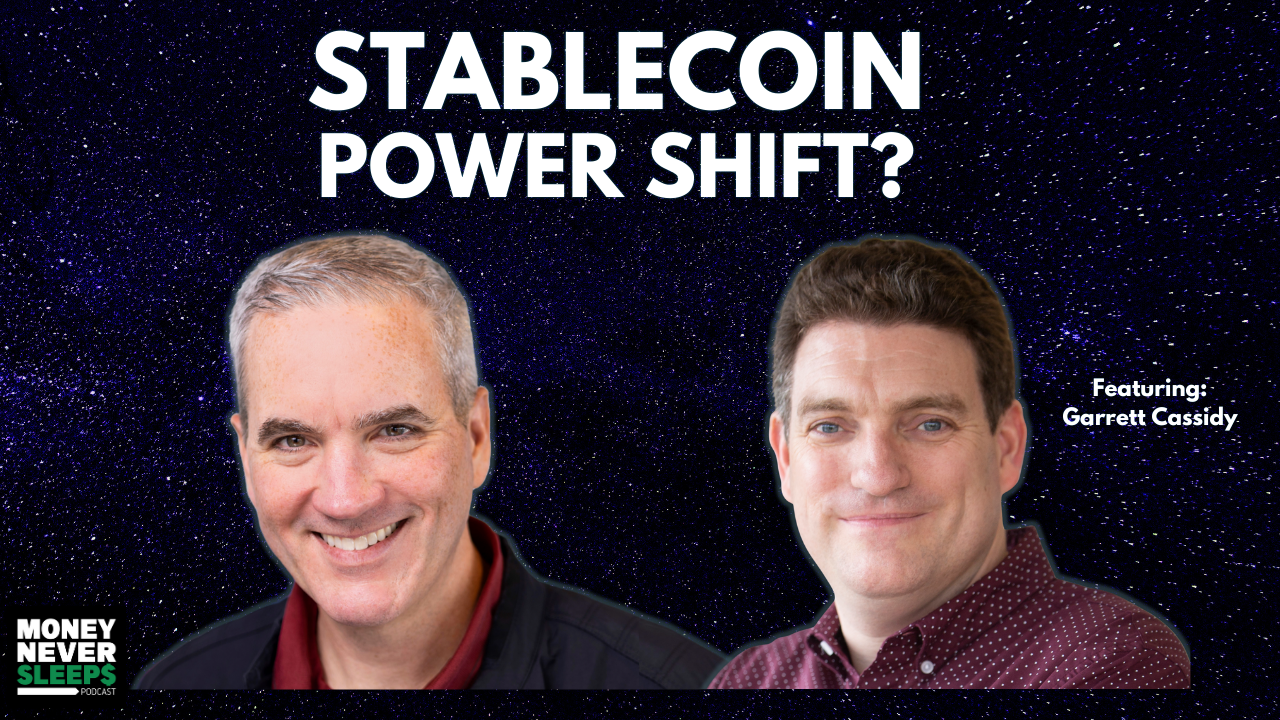162: Money Talks #45 | Pete Townsend’s Irish Tech News Interview on Digital Finance | Rory Galvin on the Finsight Series


Suzanna Hayek from Irish Tech News interviews Pete Townsend on Pete Townsend on financial trends, digital finance and investing in startups. This interview was originally aired on Irish Tech News in early September, and they kindly gave us permission to share the content. We also brought Rory Galvin from Navirum back onto the show to give us some quick insights on the next edition of the Finsight Series ‘Beyond WealthTech’ virtual event coming up on November 17th.
This episode of MoneyNeverSleeps is sponsored by Philip Lee, one of Ireland’s fastest-growing corporate law firms and expert advisors at the heart of the Dublin and London startup, fintech and crypto communities.
Rory Galvin from Navirum on the Finsight Series - Beyond Wealthtech and the Future of Wealth Management - Registration page for the virtual event coming up on 17th November 2021
Suzanna Hayek Interviews Pete Townsend for Irish Tech News:
Pete Townsend on what to look for from the eCommerce giants and digital finance:
“The ethos of Amazon is low prices, and the leadership of Amazon is looking at opportunities in financial services and saying, ‘will the offering of financial services through Amazon enable customers to have lower prices?’. If Amazon can remove their dependence on the whole credit card ecosystem, then they are saving themselves around 3% of revenue, which is in excess of a $1 billion a year in savings for Amazon.
“Can they drive that back into lower prices for customers? Yes, I expect so. Could they start doing some type of digital payments? Yes, there have been signs of Amazon hiring some crypto and blockchain talent recently. It won’t be in-your-face like ‘Amazon Bank’, as becoming a bank is a big thing.”
On how Pete thinks about digital finance:
“To me, digital finance is enabling the buying and selling of financial products and services, both by institutions and individuals, through a 100% digital experience. The key thing is that it is 100% digital across the entire value chain, from how a financial product is created all the way down to how it does what it's supposed to do.”
“When you think about a financial product, you're spending, you're saving, you're investing, you're insuring, either at the individual or institutional level. There is a wonderful example out there of how to do those things 100% digitally and it’s called cryptocurrency. It's really about this idea that you do not have to go offline at all to move value around the world and being able to do that as an individual or an institution.”
On the increasing adoption of crypto around the world:
“Crypto is an incredibly successful twelve-year proof of concept for what is, to me, the wider digitalization of finance - this needed to happen. When Bitcoin was created back in 2008-2009, was it solving a problem for the world? Was it fulfilling a desire? I think it was fulfilling a desire to give people more economic freedom and the ability to send value and exchange value instantaneously around the world.”
“There is still a lot to do in the crypto space [to make it easier to use], but there’s been so much adoption of crypto, especially in the last 18 months. CNBC recently put out a map of the cryptocurrency adoption index around the world, and the top country in the last year for crypto adoption was Vietnam, which was really surprising to see.”
“Afghanistan was in there as well, and that’s not surprising, based upon what's been happening there. People are seeking to preserve value [and move value] in the face of their currency being devalued, and they’re doing that through crypto.”
On businesses adopting crypto as a means of payment and as a reserve asset:
“To really get their heads around enabling payment in [crypto], payment providers are building up their own reserves in crypto. If you're going to enable payment in crypto, you might hold it on behalf of users. Having an inventory of crypto gives you a much greater understanding of the risks of providing your customer with that kind of service.”
“So, PayPal have built up an inventory and Square have built up a big inventory in crypto. Even Microstrategy has, who are not a payment business. They built up a big inventory of it in the last year and a half because they saw it as a reserve asset to have on their balance sheet to help preserve value.
“There are obviously different usages of crypto, but more and more businesses are thinking about crypto, more and more businesses are accepting it, and it's moving so fast that it's really hard from one day to the next to keep up.”
“Unless you're looking at what’s happening in crypto every day, six months may go by, and it's just a flash, it’s a blur of what's just happened.”
On the intersection of financial inclusion and crypto:
“Financial inclusion is not charity, it’s a business model. It’s about being able to keep your costs low so that your customers don't have to pay through the nose for your product. We also have over a billion people around the world who still do not have access to a bank account. How are people going to transact as the world has become so much more digital over the last two years?”
“If you think about the digitalization of cash, how can we make it just as easy for people to use cash and exchange cash for goods [wherever they live], but also at the same time, turn that cash into a digital version of itself to send around the world?”
On what Pete looks for in startup founders:
“First and foremost, be a good person. It really starts with the founder and their background. Also, what problem are you solving, and is that problem big enough for either an individual or a business to give you money to solve that problem? How intense is the problem? How frequent is it? And does the founder have deep firsthand experience with the problem they're solving?”
“There is ‘solving a problem’, but there's also ‘fulfilling a desire’. I like to use the example of the baseball cards that I used to collect way back in the day - were those baseball cards solving a problem? No, they were fulfilling a desire that I had to get closer to the team and the players who I was a big fan of - the Boston Red Sox. I was paying a lot of money for baseball cards back at the time, and they weren't solving a problem.”
“If you look at the NFT (non-fungible token) space and where that is going, a lot of money is going into this space. Are NFTs specifically solving a unique problem for a consumer? Not really, they’re fulfilling a desire – a desire to have this sense of ownership.”
“After thinking about solving a problem or fulfilling a desire, what’s your plan to reach those customers? If you’re B2B, how do you bring those businesses to consumers, and if you’re B2C, how do you monetize the interest that other businesses might have in your customers?”
On how to get started in investing in startups:
“Do your homework - never let anybody else's enthusiasm for a particular investment cause you to just say ‘hey, I’m investing in that’. 95% of startups fail, so if you are going to get into investing in startups, make sure you do it in an area where you've got some good knowledge.”
“As an investor, you’re going to look at a business and say ‘does that founder have deep firsthand experience with the problem they're solving?’. In the same way, as an investor, can I align myself with that and understand the problem that's being solved? And if you can’t get there, don't invest. It’s not easy and it’s not incredibly accessible for those with the capital to just start investing in startups and you're going to need some help with that.”
LINKS:
Register for the next edition of the Finsight Series hosted by Navirum and Salesforce
Leave a review and subscribe on Podchaser| Apple Podcasts | Spotify| Google| Overcast
Check out our MoneyNeverSleeps website
Subscribe to our newsletter on Substack
Follow us on Twitter Podcast| Twitter Pete| Twitter Eoin
Get in touch at info@moneyneversleeps.ie
--- Support this podcast: https://anchor.fm/moneyneversleeps/support


































